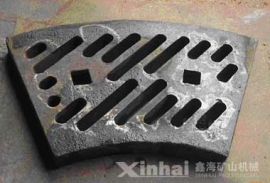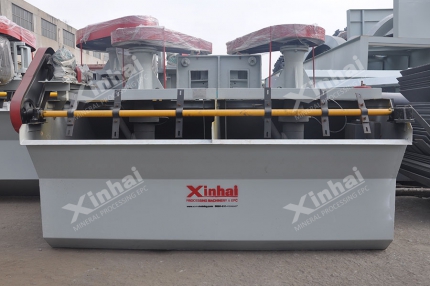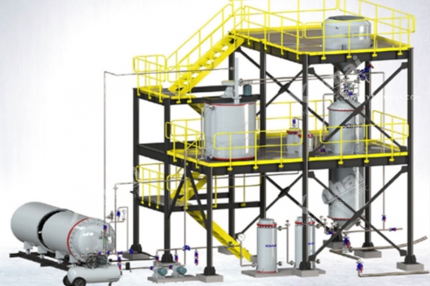Phosphate refers to the general term of phosphate minerals which can be used economically. It is an important chemical mineral raw material. It can be used to make phosphate fertilizer, also can be used to make yellow phosphorus, phosphoric acid, phosphates and other phosphates, which can be used in medicine, food, matches, dyes, sugar making, ceramics, national defense and other industrial sectors.
In industry, the main phosphate mineral extracted from phosphorus is apatite, followed by sulfur, phosphorus, aluminum strontium, struvite and bluestone. About 95% of the phosphorus in nature is concentrated in apatite. Using different surface properties of phosphate minerals and impurity minerals, flotation agents are used to float phosphate minerals to achieve separation. This phosphate processing method is called a positive flotation. The other phosphate processing method is to float an impurity mineral and sink a phosphate mineral, called reverse flotation.
In order to make the phosphate processing more effective, it is often necessary to add inhibitors to inhibit the rise of certain minerals.
Concentrate can be obtained by thickening, filtering and dewatering the pulp containing phosphate from the flotation machine.
The reasons for hard flotation are:
1. Micro-fine phosphate ore's surface energy is large, in some condition, micro-fines with different components would form non-selective agglomeration, surface forces cause agglomeration, also causes micro-fine to adhere to the coarse surface and become mirco-fine cover influence flotation.
2. As micro-fine particles have a large specific surface area and surface energy, higher drug adsorption capacity, lower selective adsorption, surface solubility increased, "inevitable ion" in the pulp raised, at the same time, as the micro-fine particles have light weight, and can be susceptible to mechanical entrainment of water and foam mechanical entrainment.
Mirco-fine phosphate ore has low adhesion efficiency with the bubble, it can decrease the bubble capture capability, at the same time, mirco-fine would adhere to the bubble cause the bubble "armor" and influence the bubble carrying capacity.
In actual production, we always take some measures to strengthen micro-fine phosphate ore flotation for increasing the phosphate processing efficiency.
1. Adding a dispersant to prevent micro-fine particles coagulate each other to ensure adequate dispersion.
2. Use appropriate micro-fine phosphate ore flotation reagent to make the surface hydrophobic selectivity hydrophobilizing.
3. Make micro-fine phosphate ore selective flocculation, increased size to facilitate the flotation, so we usually use hydrophobic flocculation, flotation and selective flocculation carrier route.
4. Decrease flotation bubble size. In order to achieve microbubble flotation, we can choose the appropriate frother or microbubble flotation column, etc.
Class Phosphate Processing Case

Uganda 720tpd Phosphate Processing
Ore Characteristic: high phosphorus tailings in magnetic separation plant, -200 mesh accounts for 50%
Processing Solution: Desilting - a section of closed-circuit grinding - one coarse one sweep two fine flotation - concentrate dehydration process


 marketing@ytxinhai.com
marketing@ytxinhai.com  0086 13810327080
0086 13810327080 






































































































 CHAT
CHAT MESSAGE
MESSAGE




